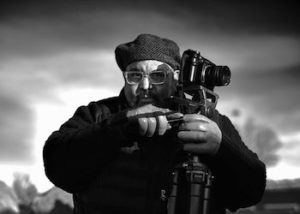
Darwoud Bey
*The birth of Dawoud Bey is marked on this date in 1953. He is a Black photographer and educator. Born David Edward Smikle in New York City's Jamaica, Queens neighborhood, Smikle attended PS 131 grade school and graduated from Benjamin N. Cardozo High School.
He changed his name to Dawoud Bey in the early 1970s, studied at the School of Visual Arts in New York from 1977–78, and spent the next two years as part of the CETA-funded Cultural Council Foundation Artists Project. In 1990, he graduated with a BFA in Photography from Empire State College and received his MFA from Yale University School of Art in 1993. Throughout his career, Bey has participated in more than 20 artist residencies, which have allowed him to work directly with the adolescent subjects of his most recent work.
A child of the 1960s, Bey says both he and his work are products of the attitude, "If you’re not part of the solution, you’re part of the problem." This philosophy significantly influenced his artistic practice and resulted in a way of working that is both community-focused and collaborative. Bey’s earliest photographs, in the style of street photography, evolved into a seminal five-year project documenting the everyday life and people of Harlem in Harlem, USA (1975–1979), exhibited at the Studio Museum in Harlem in 1979. Over time, Bey develops a bond with his subjects by being more political. His work has a "definite political edge" to it, according to Roy Decarava.
He wrote more about the aesthetics of Beys' work, how it's associated with documentary photography, and how his work shows empathy for his subjects. Of his work with teenagers, Bey has said, "My interest in young people has to do with the fact that they are the arbiters of style in the community; their appearance speaks most strongly of how a community of people defines themselves at a particular historical moment." During a residency at the Addison Gallery of American Art in 1992, Bey began photographing students from a variety of high schools both public and private, to “reach across lines of presumed differences” among the students and communities.
This new direction in his work guided Bey for the next fifteen years, including two additional residencies at the Addison, an ample number of similar projects across the country, and culminated in a major 2007 exhibition and publication of portraits of teenagers organized by Aperture and entitled Class Pictures. Alongside each photograph in Class Pictures is a personal statement written by each subject. This rich combination of image and text expands the notion of the photographic portrait and further creates portraits that are each incredibly powerful in their amalgamation, at times surprising, disturbing, and heart-wrenching.
In 2018, his project Night Coming Tenderly, Bey consists of a series of photographs evoking the imagined experience of escaped slaves moving northward along the Underground Railroad. Currently living in Chicago, Illinois, Bey is a professor of art and a Distinguished College Artist at Columbia College Chicago.
Bey was the recipient of an artist fellowship at Creative Artists Public Service (CAPS), New York, in 1983, an artist fellowship from the New York Foundation for the Arts in 1986, a regional fellowship from the National Endowment for the Arts in 1991, and the John Simon Guggenheim Memorial Foundation Fellowship in 2002. He has exhibited in several solo and group shows, including Dawoud Bey: Portraits 1975-1995 at the Walker Art Center in 1995, Dawoud Bey at the Queens Museum of Art in 1998, Dawoud Bey: The Chicago Project at the David and Alfred Smart Museum of Art in 2003 among others.
In 2017, Bey was the MacArthur Fellowship "no strings attached” grant awarded by The John D. and Catherine T. MacArthur Foundation, otherwise known as the "genius grant." The grant goes to individuals who have shown "extraordinary originality and dedication in their creative pursuits." The article "'A Radical Reshaping of the World is Possible, One Person at a Time': Dawoud Bey on being Awarded a MacArthur Genius Grant by Chloe Coleman of The Washington Post gives more insight about Dawoud Bey receiving his award and giving thanks.